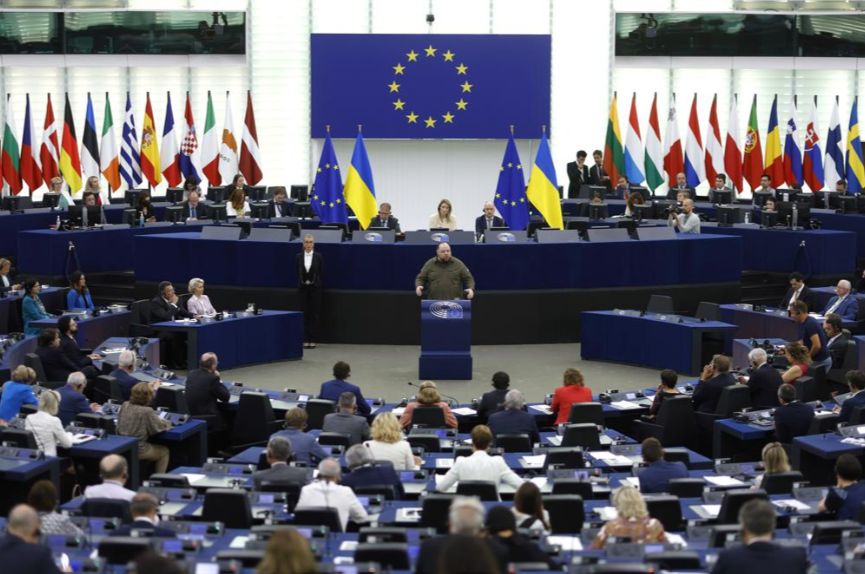By Eric Vandenbroeck and co-workers
The speaker of the Ukrainian Parliament made a vibrant plea Yesterday
for his country to be named a candidate for European Union membership, a move
that would bring the war-torn
nation closer to the EU without guaranteeing its admittance.
Ruslan Stefanchuk, chairman of the Verkhovna Rada of Ukraine, told EU lawmakers that failing
to give Ukraine a sign of an open door would be a clear signal to Russian
President Vladimir Putin that “he can be totally going forward without any
punishment.”
Below Chairman of the Verkhovna Rada
(Ukrainian parliament) Ruslan Stefanchuk, center,
delivers a speech at the European Parliament, Wednesday, June 8, 2022, in
Strasbourg, eastern France;

Hence this summer, the 27 member states of the European Union will have
to make a historic decision: how to formulate their answer to Ukraine’s
application in February to become a member of the bloc. Although they’ve been
less in the spotlight, Moldova and Georgia also knock on the EU’s door. Like
Kyiv, Chisinau and Tbilisi hope to finally get an unequivocal statement from
Brussels about their path to EU membership.
The European Commission is on the applicants’ side—especially
Ukraine’s. In February, commission President Ursula von der
Leyen famously pronounced that Ukraine is “one of us, and we want them
in the European Union.” While most power in the EU isn’t located in
Brussels—it’s the national capitals and their representatives in the European
Council that make the critical decisions—the commission is expected to
recommend an official membership perspective for the three applicants. What
sounds like a bureaucratic formality with an uncertain outcome is highly
consequential. In Ukraine’s case, an official designation as an EU candidate—or
even the second-class status of a potential candidate—would send a strong
message of support; open a path to eventual membership in the bloc, however
distant; and make abundantly clear to Moscow that the EU has no intention of
giving in to the Kremlin’s claims to control Ukraine.
That said, there is no realistic path for the trio to become members, no
matter what the commission decides quickly. Even an actual candidacy for
membership with its formulated path for accession—in essence, a long to-do list
for various reforms that align a candidate’s laws, economy, and governance with
EU norms—would not guarantee anything except a long transition period, as Turkey’s
candidate status since 1999 can attest. The upgrade to
so-called potential candidate status currently seems most realistic for
Ukraine, Moldova, and Georgia.
That full-fledged candidate status isn’t in the cards was first
disclosed by Italian Prime Minister Mario Draghi, who said in late May that
most of the more prominent European Union members are against such a fast track
to membership negotiations. “The status of EU candidate for Ukraine is objected
to by almost all the major states of the union,” Draghi said. “I would say all
of them, excluding Italy.” But while the category of only a potential candidate
falls short of formal candidacy, even having lesser status would open the door
to negotiations in the not-too-distant future. It is also a step up from their
current designation as associated partners—in essence, friendly neighbors that
enjoy unique relations with the EU.
At first glance, the status of potential EU candidacy may not sound
like much. It would put the three countries on par with Bosnia, Herzegovina,
and Kosovo, which are not exactly on a fast track to membership. It would be
less than Ukraine and its supporters in the commission want, placing it behind
current membership candidates Turkey and Serbia, which has been an EU candidate
since 2012. The latter two countries’ paths away from the EU’s democratic norms
over the last 20 years mean that their membership aspirations may never
materialize.
Notwithstanding these uncertainties, even potential candidate status
would mean much for Ukraine and the other two aspirants. It would formally
ratify their European aspirations, which the European Commission and Parliament
have publicly and repeatedly acknowledged. In March, the European
Council, where member states make their decisions, released a statement that
Ukraine belonged to “our European family.” However, it failed to say whether
that implies future membership. The shift of Ukraine, Georgia, and Moldova from
mere “associated” countries—a status reserved for the EU’s partners around the
world—to potential accession states and its various formal mechanisms of
alignment with the bloc has not only symbolic significance but also
geopolitical, legal, economic, and psychological significance. It would give
the three aspirants a direction for domestic reforms and geopolitical
alignment.
The three countries’ status as potential or even proper EU candidates
would shift the geopolitics of Eastern Europe. The current gray zone between the West and
Russia (with its satellites, Belarus and Armenia) would become a little less
gray. To be sure, only the entire EU and NATO membership would secure the
Eastern European geopolitical space. But by giving the three aspirants an
official membership perspective, the EU would send a strong signal of where the
train is headed.
A membership path would also provide important carrots and sticks with
which the West can speed up Eastern Europe’s transition and ensure the region’s
future stability. That’s because membership is conditioned on compliance with
EU standards, including regulations, legal rights, trade in goods and services,
transparency, and democratic governance. Future accession is thus an effective
instrument for Brussels—and for reform-minded leaders in the three countries—to
overcome local resistance by vested interests, immobile bureaucrats, and other
opponents of reform.
The recent experience of integrating other Eastern European
countries—the bulk of which only joined the EU in 2004—would set the agenda for
the coming years, including knowledge transfers, institutional support, and
financial assistance. Several institutions and mechanisms created by Brussels
to prepare the Western Balkan
countries for accessions, such as the Center for Security Cooperation and
the Center of Excellence in Finance, could easily be expanded to include
Ukraine, Georgia, and Moldova.
For updates click hompage here